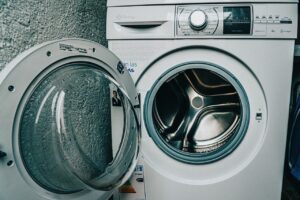 In most situations, double glazing faults take years to appear – some people don’t experience any issues with their double glazing at all. 73% of people experience no issues whatsoever in the first 10 years with their double glazing. However, faults can happen, especially over time. Identifying the problem early on and finding someone to fix your double glazing faults is essential in keeping your home well insulated and secure.
In most situations, double glazing faults take years to appear – some people don’t experience any issues with their double glazing at all. 73% of people experience no issues whatsoever in the first 10 years with their double glazing. However, faults can happen, especially over time. Identifying the problem early on and finding someone to fix your double glazing faults is essential in keeping your home well insulated and secure.
At Cloudy2Clear, we’re leading specialists in providing quality double glazing solutions. We’re dedicated to providing the best double glazing services, with over 15 years of experience in industry. We’re also passionate about informing the public about ways to recognize their double glazing has developed a fault – as any problems reduce the energy efficiency of your home.
Here’s our guide to the most common double glazing problems, as outlined by a 2021 survey by Which.
Windows or doors becoming difficult to open or close (30%)
If your double glazed windows or doors become difficult to open and close, they may need repairing. Your doors and windows can fail due to mechanical reasons, such as locks and handles being faulty or hinges shifting over time. It’s worth checking each hinge, handle, and lock to identify where the problem is coming from before seeking a repair.
They can also grow more difficult to use effectively due to weather conditions. When it’s hot outside, your frames and windows can expand – shrinking again once the weather becomes cold. This puts strain on your fixtures and can cause them to lose their shape over time. To avoid this, wipe over your window and door frames with cold water in very hot weather.
Windows or doors dropping over time, so they don’t fit as well (20%)
One of the key reasons windows or doors become hard to open or close is that they have dropped over time. As we mentioned above, this can happen due to the weather or mechanical faults. A double glazed window or door that doesn’t fit the frame correctly loses its energy efficiency, since cool air can enter the home through even the smallest of gaps between the frames. This is why it’s important to get the problem fixed as soon as possible.
Other key signs your double glazing needs fixing due to sagging include:
- Loose hinges that don’t improve when you tighten the screws
- Doors and windows that get ‘stuck’ when you open and close them
- No improvement to the problem when you’ve oiled the hinges and handles
- Feeling a draught entering the home where the window or door doesn’t fit correctly
Locks not working (15%)
The locks on your windows and doors can also fail, meaning the security of your home is compromised. To keep your family and possessions safe, get any broken locks fixed as soon as you notice them.
Glass steaming up or problems with condensation (14%)
 Whenever damp, humid air comes into contact with colder surfaces, condensation can form. Steamed glass is a bad sign for double glazed windows, as the constant presence of water by the seals around your window can weaken the seal – eventually causing gaps and letting warm air escape your home. Excessive amounts of condensation can also result in mould around your windows, as the damp air provides the perfect conditions for mould to grow and spread.
Whenever damp, humid air comes into contact with colder surfaces, condensation can form. Steamed glass is a bad sign for double glazed windows, as the constant presence of water by the seals around your window can weaken the seal – eventually causing gaps and letting warm air escape your home. Excessive amounts of condensation can also result in mould around your windows, as the damp air provides the perfect conditions for mould to grow and spread.
If you notice condensation or cloudiness between the two panes of your double glazing, your windows probably need replacing. This can happen at any point with double glazing, especially in the winter months as your home is kept at a warmer temperature than it is outdoors.
The good news here is that there are preventative measures you can take that help avoid the issue of condensation in the first place.
- Ventilate rooms with fresh air, opening windows when the weather isn’t too cold
- Open windows when showering or bathing to let steam escape
- Use extractors where possible, such as your oven extractor fan
- Install ventilation systems – trickle vents and air bricks can help
- Use a dehumidifier to reduce the humidity levels within your home
Seals around doors or windows failing (12%)
As we mentioned above, the seals in your double glazed windows or doors can fail. This can happen for a number of reasons, but it’s important that you get these faults fixed to maintain the energy efficiency of your windows.
· Natural Wear and Tear Over Time
As our windows age, so does the quality of the seals around them.
· Weather Damage
In summer months, your windows are exposed to high temperatures that can cause the glass to expand. This places additional pressure on the seal as it copes with the extra weight. At night when the weather cools down, the glass then shrinks. This repeated process can damage the seal due to the constant expansion and shrinking of glass putting extra stress on the seal.
· Faulty Manufacturing
Damaged window seals can result from faulty manufacturing or defective materials used to install your double glazed windows. To avoid this from the beginning, look for a quality double glazing specialist with excellent reviews. If broken seals occur due to product faults, your manufacturer may have a window warranty in place so it’s always worth checking before you seek a repair.
- Improper Maintenance
The more care we treat our windows with, the longer they will last. If you use damaging products on your windows such as pressure washers or strong cleaning products that can wear the plastic down, this can damage the seal.
Double glazing cracking or shattering (4%)
Windows can break or crack, depending on the weather conditions and the way you treat them. While this is the least common of the reasons double glazing becomes faulty, it can happen. Prevent any damage to your windows by:
- Opt for tempered glass when you have your double glazing fitted.
- Choose pale-coloured window coverings avoiding exreme temperature differences.
- Reduce humidity in your home by using a dehumidifier, especially in more extreme temperatures.
- Be careful around your double glazed windows and check for any scratches in the glass regularly. Any damage to the glass creates weak points, which can later cause more damage to your windows.
Repair Your Double Glazing with Cloudy2Clear
If you’ve noticed any of the above issues with your double glazed windows, it’s time to get them repaired! Repairing your windows quickly is key to keeping your home energy efficient, reducing your heating bills as your windows work to insulate your home themselves.
For more information about how Cloudy2Clear can fix your double glazing, get in touch with our knowledgeable team on 0800 61 21 119. We can provide you with a free, no obligation quote so you know just how much your repairs will cost you. You can also fill out our handy online contact form if you’d like us to get back to you to discuss your quote.
 Noisy neighbours can be the source of the distracting sounds you’re hearing within your own home. Barking dogs, DIY projects, and loud music are just a few of the constant sounds that can disrupt your home life. The first step is to discuss the noise levels with your neighbours. See if you can convince them to keep quieter during the hours you’re working or sleeping.
Noisy neighbours can be the source of the distracting sounds you’re hearing within your own home. Barking dogs, DIY projects, and loud music are just a few of the constant sounds that can disrupt your home life. The first step is to discuss the noise levels with your neighbours. See if you can convince them to keep quieter during the hours you’re working or sleeping. Window manufacturers offer a warranty with their products, sometimes providing lifetime warranty policies that can last for decades. The majority of window warranties cover all elements of the window, including hardware (handles, locks), the glass, frame, and finish of your window.
Window manufacturers offer a warranty with their products, sometimes providing lifetime warranty policies that can last for decades. The majority of window warranties cover all elements of the window, including hardware (handles, locks), the glass, frame, and finish of your window. Tempered double glazing is processed glass that’s been treated with chemicals or thermal treatments to result in a stronger, safer glass. Also referred to as toughened glass, tempered glass is ideal for situations where health and safety is of the utmost concern. Tempered glass, even when broken, is safer than the other types such as annealed glass – since it breaks down into many small, granulated shards that won’t cause as much significant injury as jagged pieces would.
Tempered double glazing is processed glass that’s been treated with chemicals or thermal treatments to result in a stronger, safer glass. Also referred to as toughened glass, tempered glass is ideal for situations where health and safety is of the utmost concern. Tempered glass, even when broken, is safer than the other types such as annealed glass – since it breaks down into many small, granulated shards that won’t cause as much significant injury as jagged pieces would. Self-cleaning glass is most commonly used in situations where windows will be hard to reach – such as in skyscrapers or top storey floors. Self-cleaning glass was once a seemingly impossible invention, and while the mechanisms do still have a long way to go, we now have access to technology that keeps our windows dirt-free for us.
Self-cleaning glass is most commonly used in situations where windows will be hard to reach – such as in skyscrapers or top storey floors. Self-cleaning glass was once a seemingly impossible invention, and while the mechanisms do still have a long way to go, we now have access to technology that keeps our windows dirt-free for us. Noise control glass is favoured for homes and commercial buildings in areas with high levels of noise pollution. These might be in cities with a lot of traffic, near a main road, or in offices surrounded by construction sites. Whatever the compounding decision to use noise control glass is, it’s safe to say that it’s a great addition to many homes – a place we should feel relaxed and in control of our own environment, rather than being subject to external conditions that are beyond our control.
Noise control glass is favoured for homes and commercial buildings in areas with high levels of noise pollution. These might be in cities with a lot of traffic, near a main road, or in offices surrounded by construction sites. Whatever the compounding decision to use noise control glass is, it’s safe to say that it’s a great addition to many homes – a place we should feel relaxed and in control of our own environment, rather than being subject to external conditions that are beyond our control. The majority of cold air in the home enters the house through even the tiniest of gaps that can allow draught into your living space. Investing in upgrading your windows and doors to draught-proof designs will save you a great deal of money in the long run.
The majority of cold air in the home enters the house through even the tiniest of gaps that can allow draught into your living space. Investing in upgrading your windows and doors to draught-proof designs will save you a great deal of money in the long run. Many of us don’t realise just how much we’re spending on energy wasted by keeping our appliances on standby, instead of turning them off altogether when they’re not in use.
Many of us don’t realise just how much we’re spending on energy wasted by keeping our appliances on standby, instead of turning them off altogether when they’re not in use.
